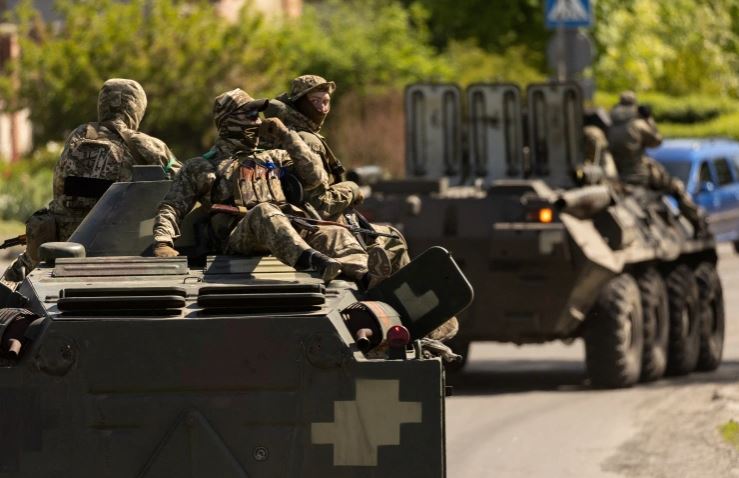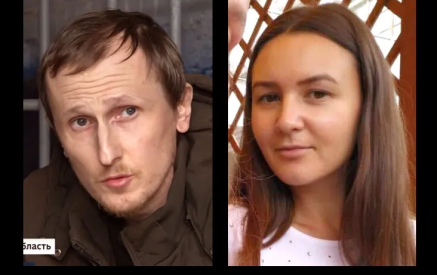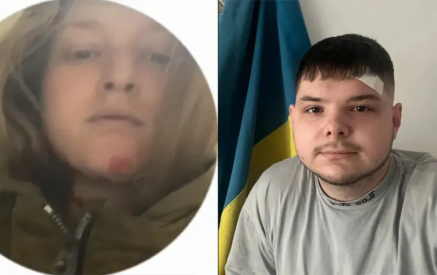Russia’s war in Ukraine, now in its third month, has already claimed an alarming number of journalists’ lives: at least seven killed in crossfire while reporting and at least six more who died in circumstances that CPJ continues to investigate.
There are at least 10 more names that do not appear on CPJ’s list of journalists killed in the conflict. All are Ukrainian, and all have worked in journalism – until Russia’s February invasion, when they left to join the war effort and died as combatants. (CPJ’s database only tracks journalists killed on assignment or in circumstances possibly linked to their journalistic work.)
There’s no official estimate of how many Ukrainian journalists have joined the military since February, a move that seemingly contradicts the journalistic norm of impartiality, even in wartime. But for some who have made that move, the decision was crystal clear.
“It’s simple: the scale of the [Russian] invasion was such that the existence of Kyiv and the country as a whole was in doubt,” former Radio Free Europe/Radio Liberty (RFE/RL) reporter Stanyslav Aseyev told CPJ by messaging app. “Had Ukraine disappeared, journalism would have been meaningless.”
Read also
Aseyev joined the Territorial Defense Forces, a volunteer unit within the Ukrainian army, just two days after Russia invaded. “We were not sure that we could hold Kyiv, even with the forces we had. That’s why defending the country became a priority,” he said.
Oleksandr Makhov, well known for his reporting on the military for Ukrainian TV, posted a photo on Facebook February 24, the day the invasion began, announcing his career change. “I’m going to war,” Makhov wrote, under the photo showing him in military clothing. “It’s time for a war of liberation! I’ll fight and kill as much as I can. I serve the Ukrainian people.”
On May 4, DOM TV, the channel Makhov worked for just before the invasion, reported he was killed by shelling at a battlefront in Izyum, in the Kharkiv region. “Eternal memory to him and all our heroes who gave their lives for Ukraine,” President Volodymyr Zelensky said of Makhov.
In articles, the Ukrainian National Union of Journalists lists media workers killed during the conflict, identifying 10 of them as having left for the military and “died with weapons in their hands.” Unlike CPJ, the union counts those who died as combatants, because “We admire every colleague who contributes to the defense of the country,” union president Serhiy Tomilenko told CPJ in an email. “Each of our deceased colleagues is a Hero to us.”
Correspondents and press freedom advocates who monitor conflict reporting said they could not recall another recent war where journalists had left to join the military in significant numbers, nor where so many had fallen as combatants. Ukraine’s fierce resistance to the Russian invasion has broad public support, which has inspired people from many walks of life to volunteer for service.
In fact, Ukraine’s battle has drawn volunteer fighters from around the world, including from Russia – and including at least one Russian former journalist. Sergei Loiko, 69, who worked for years in the Moscow bureau of the Los Angeles Times, said in March that he had gone to Ukraine “not as a journalist, but as a fighter in this Armageddon struggle between the good and evil.”
Loiko’s description would likely find wide agreement among the Ukrainian journalists who have chosen fighting over writing in this war.
“If you’re fighting for the survival of your country, as Ukrainians are, I can understand why some people would feel that they had a patriotic duty to give up journalism and go into battle,” said Ray Moseley, author of “Reporting War: How Foreign Correspondents Risked Capture, Torture and Death to Cover World War II.”
Though some World War II-era journalists left the profession to fight, to work as military press aides, or to join the Office of Strategic Services (precursor to the CIA), hundreds went to war as correspondents for their American news outlets.
Those accredited with Allied forces wore military uniforms with a large “C” for correspondent on the sleeve. Then – as now – international humanitarian law called for journalists to be treated by warring parties as civilians, as long as they did not carry weapons and fight. But in World War II, a few ignored the rules – and in doing so “they compromised their positions as journalists,” Moseley said in an interview with CPJ. Ernest Hemingway “was the most egregious violator of international law” in this regard, according to Moseley. Other reporters filed complaints with military officials that Hemingway was armed and sometimes acting as a combatant, but his military accreditation to cover the war as a journalist was never revoked, according to Moseley.
Several Ukrainians who moved from journalist to soldier have made very public announcements about the change.
Kyiv Independent journalist Artur Korniienko wrote on Twitter: “You may know me as a culture writer for @Kyivindependent. Since Russia’s invasion, I joined Ukraine’s Armed Forces and can’t write much.”
Valentyn Chernyavsky, a journalist in Cherkasy, in central Ukraine, told a local website that he had exchanged his camera and microphone for a machine gun because “I thought that now was definitely not the time for the entertainment content I was shooting.”
But in this internet age, those who go to war can still send dispatches from the frontlines.
Makhov the journalist killed in early May, used Instagram to post images from the front. Korniienko, the Kyiv Independent culture writer, told his Twitter followers “[R]eaders keep asking about our wartime culture. So I’ll tweet about things that inspire me and my comrades to keep up the fight.” Several recent tweets have praised the Ukrainian soldiers under siege in a Mariupol steel plant.
Aseyev, the former RFE/RL reporter, said he continues to write for Swiss and Austrian media but believes there is no conflict with his volunteer military service “because I’m doing opinion journalism.” In an op-ed for the Swiss site NZZ am Sonntag recently, he wrote that he now carries a weapon because “Writing alone is no longer enough to ensure Ukraine’s future.”
Russian-backed separatists captured Aseyev in 2017 in eastern Ukraine, where he had been reporting for RFE/RL and Ukrainian news sites. He was held for two-and-a-half years, then freed in a prisoner swap in late 2019, when he began work on a searing book about the constant beatings and abuse that he and other Ukrainians endured at the hands of the separatists. His book, “The Torture Camp on Paradise Street,” has been published in several languages.
Russian forces have repeatedly detained media in Ukraine since the February invasion. Given his current military status, and his past writings disclosing abuse at the hands of Russian separatists, how does Aseyev think he would be treated if he’s captured again?
“In this case,” he wrote, “a slow and very painful death awaits me.”
Committee to Protect Journalists






















































